Ask Ethan # 80: Can space expand faster than the speed of light?
And if so, how does Einstein's theory of relativity cope with this, special and general?

The end of the week means that I again choose the question from the ones you sent, and this week we were lucky to receive a question that strains the mind and distorts space and time. The reader wants to learn more about the greatest riddle of the expanding universe, relativity and dark energy:
')
To begin with, what is the speed of light.
No matter where you are or who you are, there is a severe restriction on your movement in space. It could be decided that the more energy you spend, the faster you can move ... And although this is true, it can only continue to a certain limit. If you move at a speed of several meters per second, or several kilometers per hour, or even several kilometers per second, as the Earth moves in the orbit of the Sun, you will not even notice restrictions on movement with infinite speed.
But they still exist. The faster you move - the greater your speed through space - the slower you move through time. Imagine that you are at rest on the surface of the Earth, and your friend took off from your location and on a jet plane went on a world tour. Before you broke up, you synchronized the clock to the accuracy of microseconds.

If your watch is sensitive enough, then when your friend comes back to you, you will find that the watch is a little out of sync. Your watch will show the time a little later than the clock of a friend - the difference will be approximately in tenths of microseconds, but still it will be.
And the faster you move, the greater the time difference will be.
The cosmonaut clock on the ISS, flying around the Earth in 90 minutes, is a few seconds behind the return. This difference becomes noticeable even with ordinary clocks.
The strangeness is that not only the clock goes differently at different speeds, but also time moves at different speeds.

The fact that hours are slowing at high speeds will be a consequence of the fact that time and space are connected, and that rapid movement through space means time slowing down. The relationship between space and time is determined by the speed of light. The closer you are to the speed of light, the more the passage of time asymptotically approaches zero.
Therefore, a muon, an unstable particle with an average lifetime of a couple of microseconds, can be created in the upper part of the atmosphere at a speed close to the speed of light, and reach the Earth's surface. This is a 100 km path, and if it moved along it at a speed of 300,000 km / s for 2.2 microseconds, it would break up, having covered only 0.6% of the entire path. The fact that the muon has time to reach the surface - and if you stretch your hand, then approximately one muon will fly through it every second - this is due to this relativity effect.
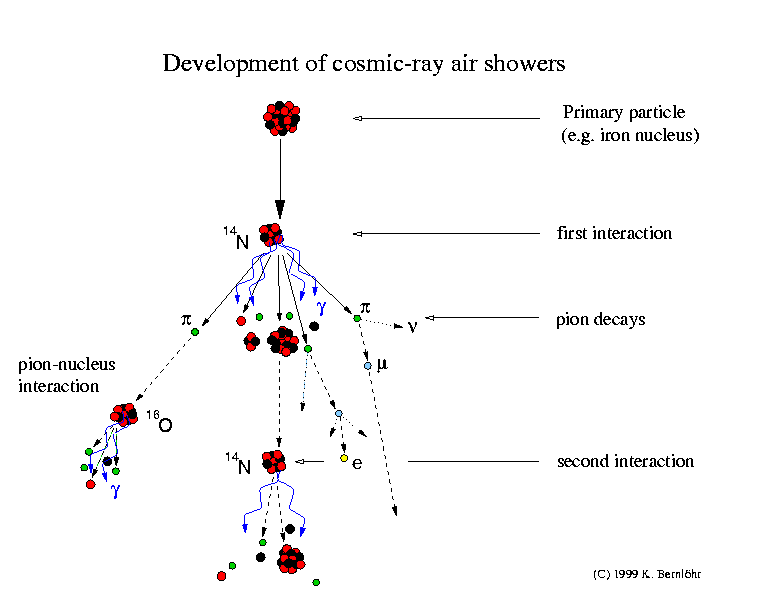
And what about the expansion of the universe? You know that if you choose a galaxy, then on average it turns out that the farther it is from you, the faster it will move away. Galaxies in the Virgo cluster, located at a distance of 50-60 million light years, move from us at a speed of 1200 km / s. Galaxies in the cluster of Hair of Veronica, located at a distance of 330 million light years, move from us at a speed of 7000 km / s.
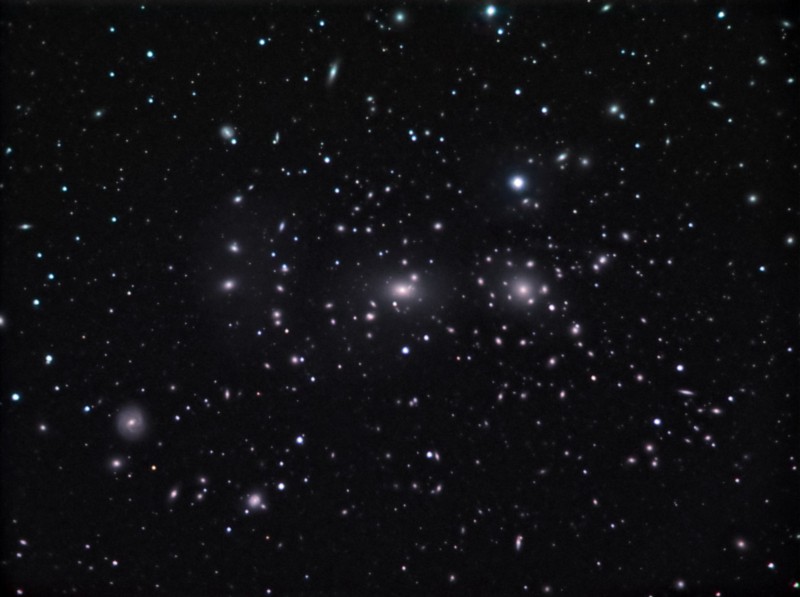
The further we look, the faster these galaxies and clusters are removed. Of course, there are deviations of several hundred or thousand km / s due to local movements and effects of gravitational attraction, but on a large scale - and at large distances - you can see that the farther they are from you, the faster they will move away. This observation was first made by Edwin Hubble in the 1920s, and it led to the Hubble law, or the law defining the expansion of the Universe. With the best modern means of observation, we can confirm the correctness of this law for billions of light years in all directions.
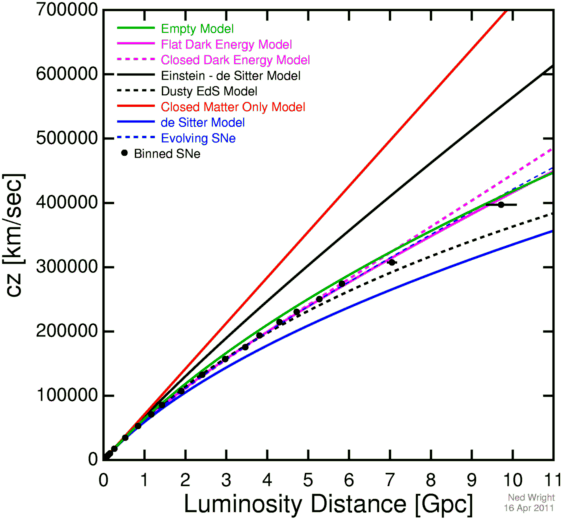
“Just a second,” I can practically hear your objections. "What about the speed of light?"
Indeed, what about the speed of light? Of course, this invisible barrier - which prevents all types of matter from moving faster than a certain restriction - enters rights and prevents galaxies from a certain moment, doesn’t it? Time asymptotically tends to zero and stops moving if you move with such speed, while it cannot move back, because then the galaxies would move back in time, wouldn't it?
But we have hidden one of the pieces of the puzzle. The speed of light as a limit applies only to objects moving relative to each other in the same place in space.
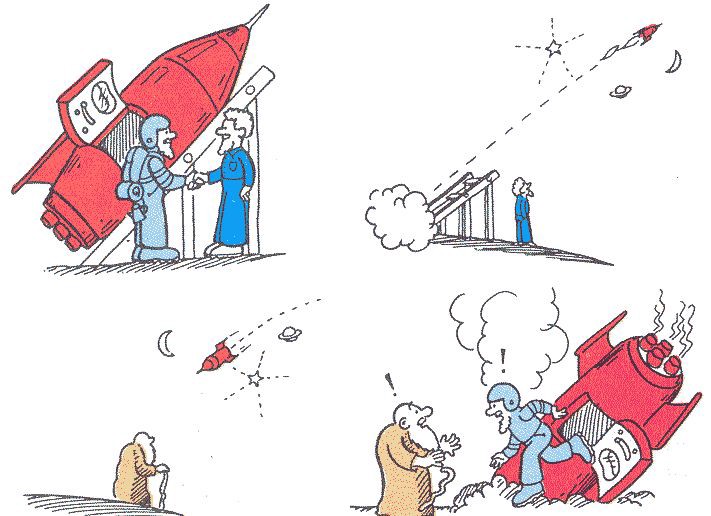
When your friend flew away on an airplane and came back with a clock lagging behind yours, it was because you met at the same place. When the astronauts return to Earth, and their journey lasted less than yours, for a few seconds, it was because you were in the same place. Even the muon, moving at near-light speed, moved relative to your reference system on Earth, and therefore you observed these effects.
But in the distant parts of the universe, these galaxies do not move at all. This space between them expands, and individual galaxies are at rest relative to space.
You may argue, "how do you know this?"
You can test: look at distant galaxies, measure their redshift and the distance to them. So you can check that they are moving at incredible speeds against all the predictions of the theory of relativity.
THAT is of two kinds: a special TO, operating in a flat static space, where only the movement of objects through space and time matter. And the general MOT, where space itself changes, and / or shrinks, and where matter and energy determine the curvature of space-time, and SRT exists on top of this system.
And that's how two predictions differ:
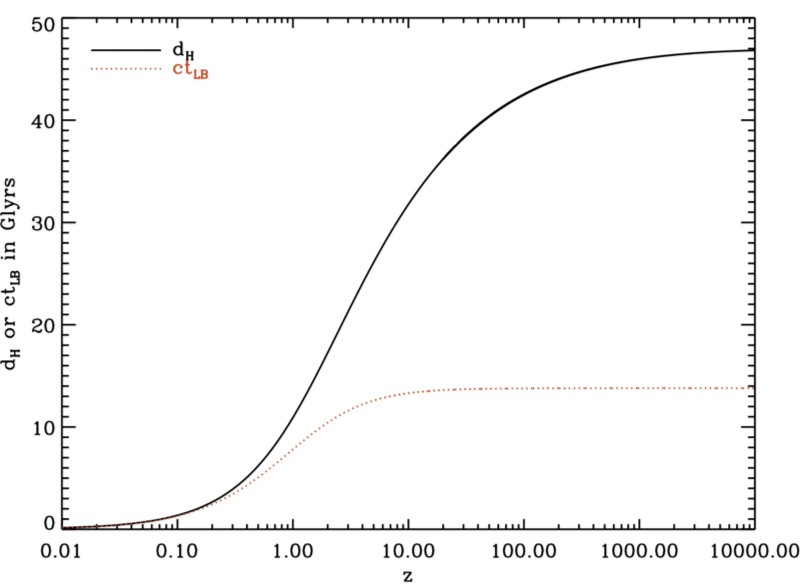
Strong, right? It turns out that our observations speak in favor of GR, and exclude the option of static space.
And what does this mean in the end? What does this mean for our expanding universe, even if we add dark energy here?

This means that over time, the light emitted by distant galaxies, has greatly shifted to the red spectrum, which led to the appearance of a cosmological redshift.
This means that there are so remote parts of the universe that the light emitted from there will never get to us. At the moment, these are all parts that are at a distance of 46.1 billion light years from us.
And this means that any object at a distance of more than 4.5 gigaparsek (14-15 billion light-years) will remain unattainable for us and for all that we are doing, henceforth and forever. All these objects, constituting 97% of the volume of the observable Universe, are beyond our reach. Even a photon emitted right now will never get to them.
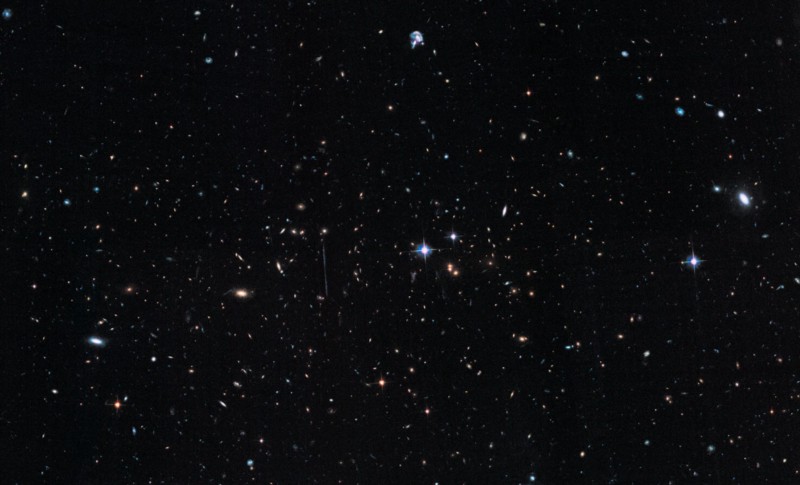
So, yes, all objects picked up by the expansion of the Universe, fly away from us with acceleration, faster and faster. It will take enough time, and all of them will move away from us faster than the speed of light, and will become unattainable for us in principle, no matter how fast the rocket we build or how many signals we send at the speed of light.
And what can we do about it?
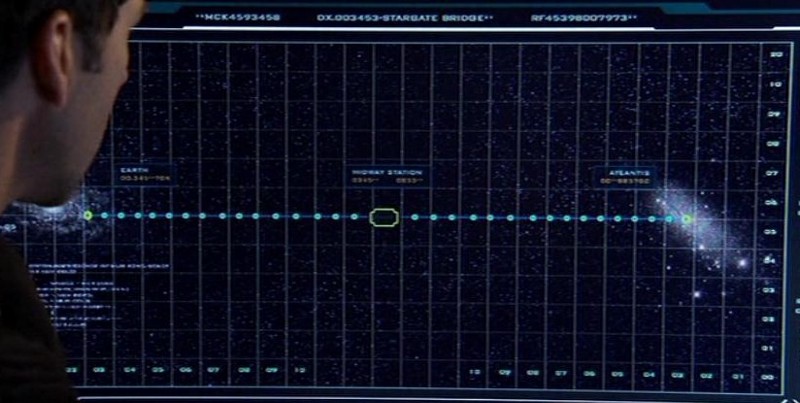
Pull yourself together and start intergalactic travel as fast as we can, before it's too late. Today's universe is disappearing due to the expansion of space. And although no object moves through the fabric of space-time faster than the speed of light, there are no restrictions on the expansion of the fabric of space. Space does what it wants.
So thank you for the wonderful question, and if the answer seems mysterious to you, be inspired by the following: The universe will disappear from the sight of humanity, unless we can do something about it, including flights to distant galaxies, or — if there is a way — approaching distant ones galaxies to us. Send me your questions and suggestions for the following articles.

If it seems to you that everything is under control, you are driving too slowly.
- Mario Andretti
The end of the week means that I again choose the question from the ones you sent, and this week we were lucky to receive a question that strains the mind and distorts space and time. The reader wants to learn more about the greatest riddle of the expanding universe, relativity and dark energy:
')
It is well known that the universe is expanding with acceleration. Is it possible for the speed of expansion to exceed the speed of light? And if so, would it not contradict the theories of Einstein?
To begin with, what is the speed of light.
No matter where you are or who you are, there is a severe restriction on your movement in space. It could be decided that the more energy you spend, the faster you can move ... And although this is true, it can only continue to a certain limit. If you move at a speed of several meters per second, or several kilometers per hour, or even several kilometers per second, as the Earth moves in the orbit of the Sun, you will not even notice restrictions on movement with infinite speed.
But they still exist. The faster you move - the greater your speed through space - the slower you move through time. Imagine that you are at rest on the surface of the Earth, and your friend took off from your location and on a jet plane went on a world tour. Before you broke up, you synchronized the clock to the accuracy of microseconds.

If your watch is sensitive enough, then when your friend comes back to you, you will find that the watch is a little out of sync. Your watch will show the time a little later than the clock of a friend - the difference will be approximately in tenths of microseconds, but still it will be.
And the faster you move, the greater the time difference will be.
The cosmonaut clock on the ISS, flying around the Earth in 90 minutes, is a few seconds behind the return. This difference becomes noticeable even with ordinary clocks.
The strangeness is that not only the clock goes differently at different speeds, but also time moves at different speeds.

The fact that hours are slowing at high speeds will be a consequence of the fact that time and space are connected, and that rapid movement through space means time slowing down. The relationship between space and time is determined by the speed of light. The closer you are to the speed of light, the more the passage of time asymptotically approaches zero.
Therefore, a muon, an unstable particle with an average lifetime of a couple of microseconds, can be created in the upper part of the atmosphere at a speed close to the speed of light, and reach the Earth's surface. This is a 100 km path, and if it moved along it at a speed of 300,000 km / s for 2.2 microseconds, it would break up, having covered only 0.6% of the entire path. The fact that the muon has time to reach the surface - and if you stretch your hand, then approximately one muon will fly through it every second - this is due to this relativity effect.

And what about the expansion of the universe? You know that if you choose a galaxy, then on average it turns out that the farther it is from you, the faster it will move away. Galaxies in the Virgo cluster, located at a distance of 50-60 million light years, move from us at a speed of 1200 km / s. Galaxies in the cluster of Hair of Veronica, located at a distance of 330 million light years, move from us at a speed of 7000 km / s.

The further we look, the faster these galaxies and clusters are removed. Of course, there are deviations of several hundred or thousand km / s due to local movements and effects of gravitational attraction, but on a large scale - and at large distances - you can see that the farther they are from you, the faster they will move away. This observation was first made by Edwin Hubble in the 1920s, and it led to the Hubble law, or the law defining the expansion of the Universe. With the best modern means of observation, we can confirm the correctness of this law for billions of light years in all directions.

“Just a second,” I can practically hear your objections. "What about the speed of light?"
Indeed, what about the speed of light? Of course, this invisible barrier - which prevents all types of matter from moving faster than a certain restriction - enters rights and prevents galaxies from a certain moment, doesn’t it? Time asymptotically tends to zero and stops moving if you move with such speed, while it cannot move back, because then the galaxies would move back in time, wouldn't it?
But we have hidden one of the pieces of the puzzle. The speed of light as a limit applies only to objects moving relative to each other in the same place in space.

When your friend flew away on an airplane and came back with a clock lagging behind yours, it was because you met at the same place. When the astronauts return to Earth, and their journey lasted less than yours, for a few seconds, it was because you were in the same place. Even the muon, moving at near-light speed, moved relative to your reference system on Earth, and therefore you observed these effects.
But in the distant parts of the universe, these galaxies do not move at all. This space between them expands, and individual galaxies are at rest relative to space.
You may argue, "how do you know this?"
You can test: look at distant galaxies, measure their redshift and the distance to them. So you can check that they are moving at incredible speeds against all the predictions of the theory of relativity.
THAT is of two kinds: a special TO, operating in a flat static space, where only the movement of objects through space and time matter. And the general MOT, where space itself changes, and / or shrinks, and where matter and energy determine the curvature of space-time, and SRT exists on top of this system.
And that's how two predictions differ:

Strong, right? It turns out that our observations speak in favor of GR, and exclude the option of static space.
And what does this mean in the end? What does this mean for our expanding universe, even if we add dark energy here?

This means that over time, the light emitted by distant galaxies, has greatly shifted to the red spectrum, which led to the appearance of a cosmological redshift.
This means that there are so remote parts of the universe that the light emitted from there will never get to us. At the moment, these are all parts that are at a distance of 46.1 billion light years from us.
And this means that any object at a distance of more than 4.5 gigaparsek (14-15 billion light-years) will remain unattainable for us and for all that we are doing, henceforth and forever. All these objects, constituting 97% of the volume of the observable Universe, are beyond our reach. Even a photon emitted right now will never get to them.

So, yes, all objects picked up by the expansion of the Universe, fly away from us with acceleration, faster and faster. It will take enough time, and all of them will move away from us faster than the speed of light, and will become unattainable for us in principle, no matter how fast the rocket we build or how many signals we send at the speed of light.
And what can we do about it?

Pull yourself together and start intergalactic travel as fast as we can, before it's too late. Today's universe is disappearing due to the expansion of space. And although no object moves through the fabric of space-time faster than the speed of light, there are no restrictions on the expansion of the fabric of space. Space does what it wants.
So thank you for the wonderful question, and if the answer seems mysterious to you, be inspired by the following: The universe will disappear from the sight of humanity, unless we can do something about it, including flights to distant galaxies, or — if there is a way — approaching distant ones galaxies to us. Send me your questions and suggestions for the following articles.
Source: https://habr.com/ru/post/396477/
All Articles